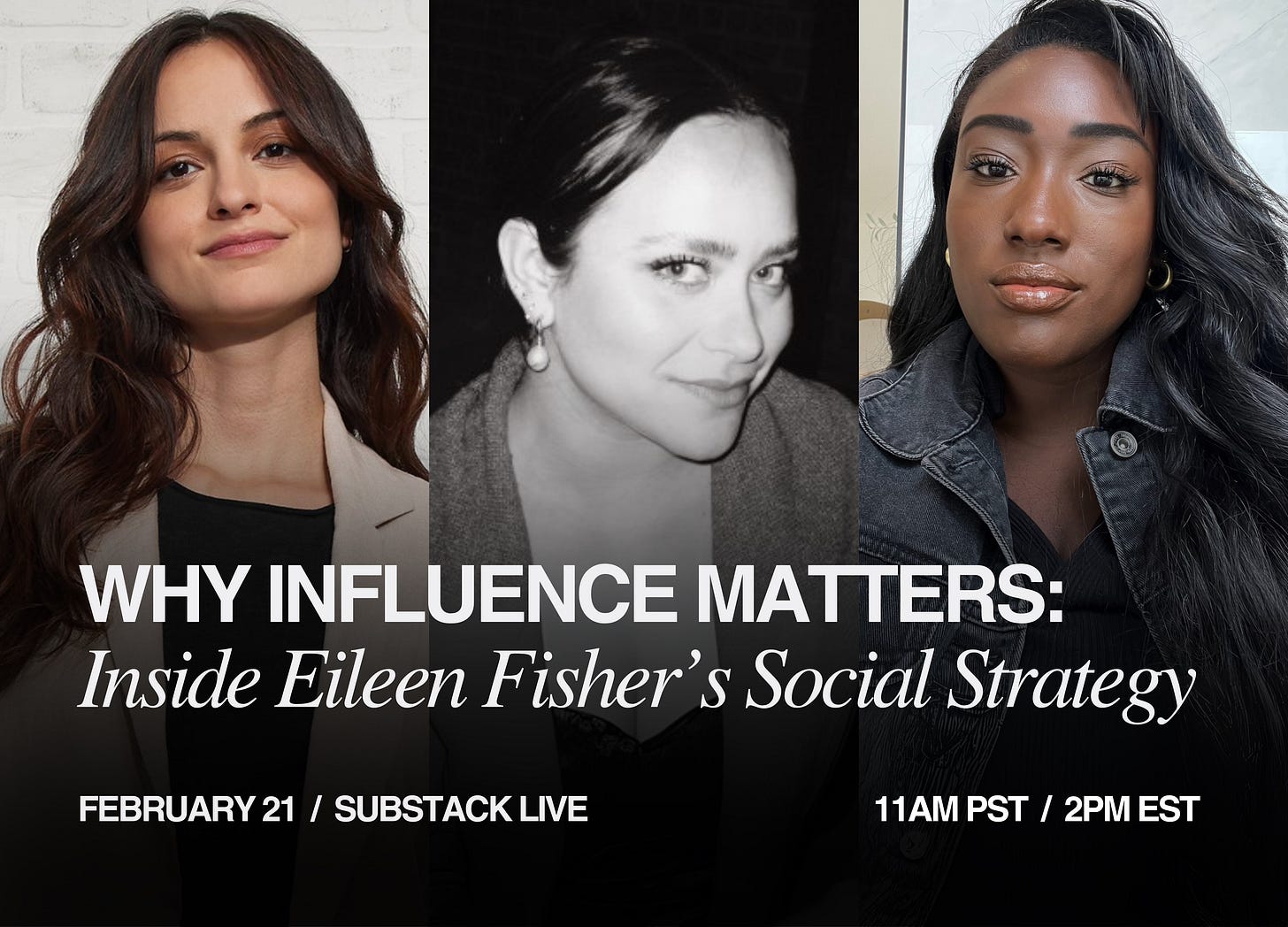I'm going LIVE with Eileen Fisher's Social Media Team TODAY!
Why Eileen Fisher is leaning into influence—and how they’re doing it without compromising their values.
Let’s be honest. For many purpose-driven brands—especially smaller ones—the focus is almost always on the product first.
Social media and influencer marketing are often seen as optional luxuries rather than strategic necessities. As a result, most of the budget goes toward creating the most sustainable and ethical products possible, while brand-building and marketing take a back seat.
The assumption? That strong values and high-quality products will speak for themselves, naturally attracting the right customers.
But a great product isn’t enough. Sustainability alone doesn’t sell.
In a world dominated by fast fashion’s emotional marketing, social validation, and aspirational messaging, sustainable brands are struggling to compete. Add in rising living costs, layoffs, and shifting cultural dynamics, and it’s clear: consumer behavior is driven by more than just sustainability.
Yes, consumers care about sustainability—but they also care about identity, belonging, social status, emotional fulfillment, and self-expression. These factors don’t just influence purchasing decisions; they often outweigh sustainability, sometimes even price.
If sustainable brands aren’t competing for attention in the spaces where decisions are made (Instagram, TikTok) or aligning with the emotional and social needs that drive consumer behavior, even the most ethical products will struggle to sell.
That’s why I was especially excited to see Eileen Fisher—an OG pioneer in sustainability—not just strengthening their marketing strategy but actively investing in their influence.
Because influence matters.
Desirability drives action. And sustainability needs to exist in the same spaces where consumer decisions are made.
But how can sustainable brands leverage marketing and influencer partnerships without diluting their values or losing trust?
How can they reach new audiences without being dismissed as inauthentic or accused of “acting like fast fashion”?
How can they tap into the psychological drivers behind consumer behavior—identity, belonging, social validation—without resorting to the same tactics as the brands they seek to challenge?
Because if sustainable brands continue relying solely on logic, ethics, and guilt—while ignoring the emotional and social forces that drive purchasing decisions—they risk struggling to convert admiration and awareness into action. Even among consumers who claim to care.
Join me next week on Substack Live for an exclusive conversation with Arden Frank and Michelle Paltan from Eileen Fisher’s social and influencer marketing team!
Here’s what we’ll cover:
Why Eileen Fisher is prioritizing influence & social media—and what prompted the shift.
How they balance marketing with mission—without diluting their values.
What sustainable brands can learn from fast fashion’s playbook—and where to draw the line.
Insights from EF’s recent campaigns: What’s working (and what’s not).
📅 Date & Time: February 21st 11am PST/2pm EST
📍 Where: Substack Live—You can join via the app or desktop. Enable notifications to get an alert as soon as we go live. Just tap it—and you’re in!
💬 Live Q&A included—bring your questions!
Save your spot:
Join us on Substack Live - just enable notifications to get an alert when we go live. One tap, and you're in!
Can't make it?
The replay will be available to paid subscribers only. Subscribe to Green Behavior now to secure access to the full conversation.






Really looking forward to this conversation though!
Hey Brittany, just a tiny typo in the date/time - April instead of February 21st. Thought it best to write to you quickly, as I saw this on LinkedIn and opened your post and then got confused when I saw April here.